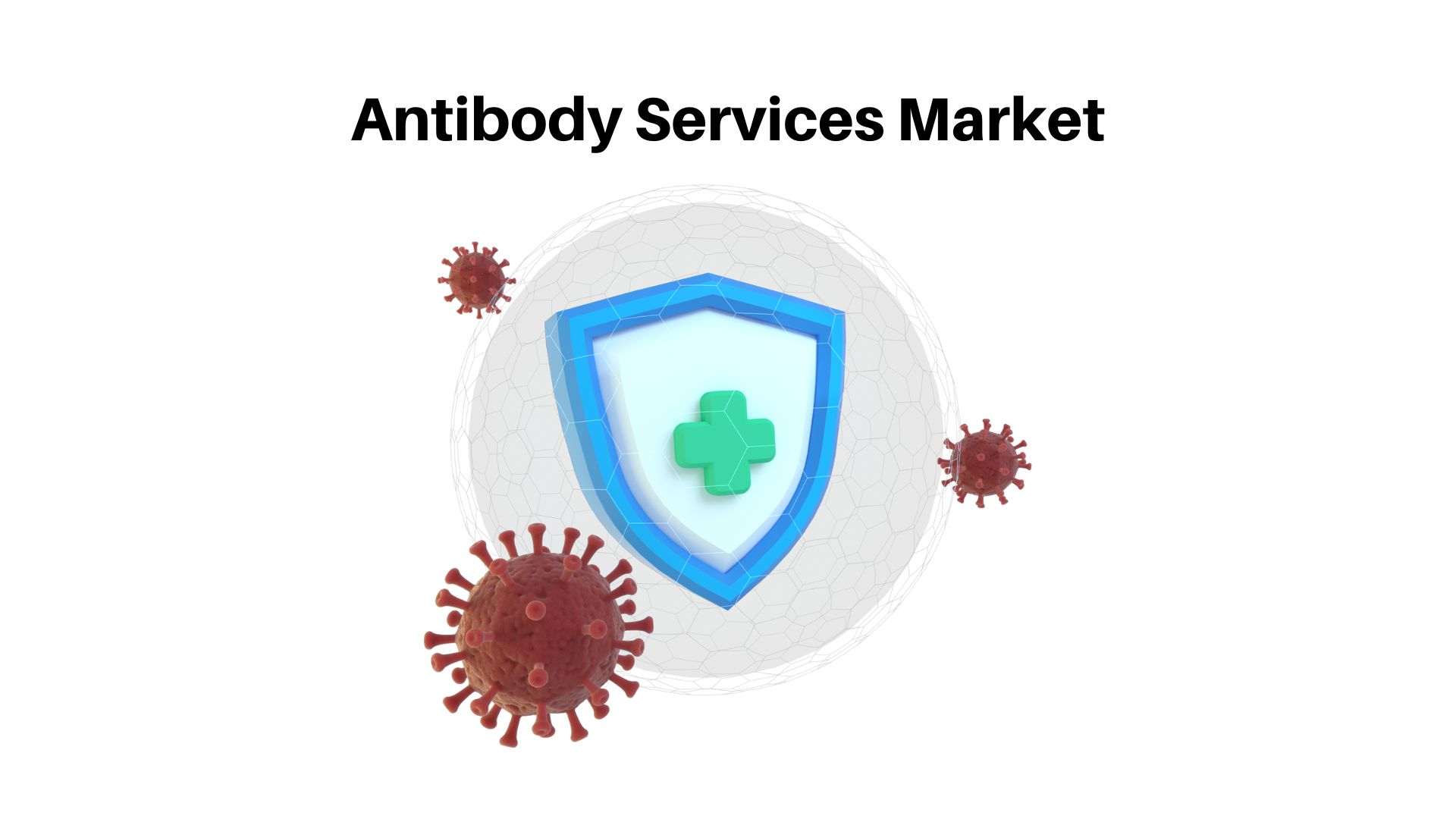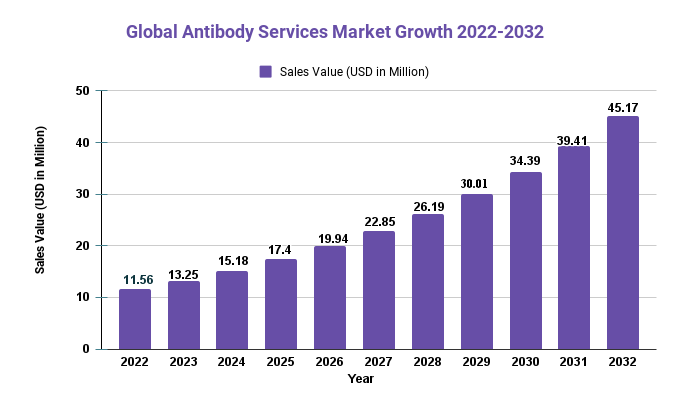Global Antibody Services Market Size was valued at USD 11.56 Bn in 2022 and is estimated to reach USD 45.17 Bn by 2032 | by Market.us

Page Contents
Published Via 11Press: Antibody services are an integral component of the biopharmaceutical industry, as antibodies are widely used for therapeutics, diagnostics and research. The antibody services market provides custom antibody production, purification and engineering solutions to biopharmaceuticals and biotechnology companies as well as research institutes and academic organizations.
The global Antibody services market size was valued at USD 11.56 Bn in 2022 and is estimated to reach USD 45.17 Bn by 2032, growing at a CAGR of 14.6% from 2022 to 2032.
The growth in this market is primarily fueled by rising demand for personalized medicine and targeted therapies, the rising prevalence of chronic diseases, and rising investment in biopharmaceutical research and development.

Regional Snapshot
The antibody services market is a worldwide enterprise, with significant demand coming from biopharmaceutical and biotechnology companies, research institutes, and academic organizations around the world. Here is an overview of some key regional segments within this global landscape:
We Have Recent Updates on the Market in Sample Copy@ https://market.us/report/antibody-services-market/request-sample
- North America: North America is the leading market for antibody services, boasting leading biopharmaceutical companies, academic institutes and research organizations. The United States leads North American growth in this area followed by Canada. Encouraged by government initiatives and investments into R&D activities, there has been an uptick in demand across this region.
- Europe: Europe is the second-largest market for antibody services, with significant demand from biopharmaceutical companies, academic institutes and research organizations. The United Kingdom, Germany, France and Switzerland are major contributors to growth in this region due to a well-developed healthcare infrastructure and supportive government initiatives. The presence of such factors is propelling demand in this region.
- Asia-Pacific: The Asia-Pacific region is expected to experience the highest growth rate during the forecast period due to increased investment in biopharmaceutical research and development as well as rising demand for personalized medicine. China, Japan, and India are the major contributors to market expansion within this region. Government initiatives to promote R&D activities along with an increasing number of biopharmaceutical companies are fueling its expansion.
- Rest of the World (RoW) includes Latin America, the Middle East and Africa. The RoW region's antibody services market is being driven by increasing investment in research and development activities, an increase in chronic diseases and increased demand for personalized medicine. Brazil, Mexico and the United Arab Emirates are major contributors to growth within this region.
Drivers
- Personalized Medicine Is on the Rise: There is a growing demand for personalized medicine, which involves using tailored therapies to treat individuals based on their genetic makeup. Antibodies play an integral role in personalized medicine and their usage is increasing, fueling the growth of the antibody services market.
- Rising Incidence of Chronic Diseases: Chronic diseases such as cancer, autoimmune disorders and infectious diseases are becoming more common worldwide. Antibodies are used extensively in diagnosing and treating these illnesses, leading to an increasing demand for antibody services.
- Investment Boom in Biopharmaceutical Research and Development: Biopharmaceutical R&D is experiencing a meteoric rise, with increased investments into new drug discovery and development. Antibodies are an integral component of this class of biopharmaceuticals and are widely employed during drug development – propelling growth in the antibody services market.
- Technological Advancements in Antibody Production: The development of new technologies for antibody production has significantly enhanced efficiency and speed, making it simpler and more cost-effective to produce large numbers of high-quality antibodies. This has contributed to the expansion of the antibody services market.
- Favorable government actions: Governments all over the world are actively promoting the expansion of the biopharmaceutical business by a variety of actions, including supporting R&D, offering tax advantages, and streamlining regulatory procedures. These actions have made the market for antibody services more conducive to growth.
Interested to Procure the Data? Inquire here at: https://market.us/report/antibody-services-market/#inquiry
Restraints
- High Cost of Antibody Development: Producing antibodies is a time-consuming and complex process that necessitates significant investment in research and development. Unfortunately, the high price tag associated with antibody creation could restrict market expansion, particularly for small and medium-sized enterprises.
- Stringent Regulatory Requirements: The development and commercialization of antibodies are subject to stringent regulatory requirements, which could delay the approval process and add extra time and cost when bringing new products to market.
- Intellectual Property Rights Issues: Intellectual property rights issues such as patent disputes and licensing restrictions could restrict the growth of the antibody services market by preventing companies from developing or commercializing certain antibodies.
- Competition from Alternative Therapies: Antibodies face competition from alternative treatments such as small molecules, gene therapy and cell therapy which could constrain the growth of the antibody services market.
- Limited Awareness and Access to Antibody Services: In some regions, there is limited awareness of the benefits of antibody services, and access to these services may be limited. This may limit the growth of the antibody services market in these regions.
Opportunities
- Increased Demand for Biologics: Biologics, including antibodies, are increasingly being utilized in the treatment of various diseases. This growth presents significant opportunities for those in the antibody services market.
- Growing Popularity of Immunotherapy: Immunotherapy, which utilizes the immune system to fight diseases, is becoming more and more popular. Antibodies play an integral role in this form of therapy, and the increasing demand presents significant growth prospects for companies providing antibody services.
- Rise in Demand for Contract Research and Manufacturing Services: As many biopharmaceutical companies outsource their research and production operations to contract research organizations (CROs) or contract manufacturing organizations (CMOs), antibody service providers now have an opportunity to expand their business by offering contract research and manufacturing solutions.
- Increased Investment in Precision Medicine: Precision medicine, which utilizes personalized therapies based on an individual's genetic makeup, is rapidly expanding. Antibodies play a pivotal role in this area of precision medicine and the rising investment presents significant growth prospects for the antibody services market.
- Monoclonal Antibodies Are Becoming More and More Popular: Monoclonal antibodies are being increasingly utilized for treating various diseases, providing antibody service providers with an opportunity to expand their business by offering monoclonal antibody development and manufacturing solutions.
Challenges
- Quality Control Challenges: Ensuring antibodies are safe and effective is a major responsibility, making quality control for antibodies an essential task. Unfortunately, this task can prove complex and expensive to execute effectively across large production runs.
- Absence of Standardization: Unfortunately, there is currently no standardization in antibody development and production, making it difficult to compare results across different providers and products. Furthermore, lack of consistency can make ensuring consistent quality and efficacy across different products an uphill battle.
- Difficulties in Target Identification: Identifying good targets for antibody creation can be challenging, particularly in diseases with complex pathophysiologies. Because of this, creating efficient antibodies to treat some diseases is challenging.
- Difficulties in Antibody Engineering: Changing antibodies to increase their effectiveness can be challenging in antibody engineering. It could be challenging to foresee how engineered alterations will affect an antibody's pharmacokinetics, efficacy, and safety.
- Manufacturing Obstacles: The manufacture of antibodies can be a time-consuming and expensive procedure, especially for large-scale runs. Problems with the manufacturing process could result in delays, higher costs, and lower-quality products.
Key Market Segments:
Type
- Monoclonal
- Polyclonal
Application
- BioScience Companies
- BioScience Research Institutions
- Hospitals
Key Market Players
- ThermoFisher
- GenScript
- Abcam
- MBS
- ROCKLAND
- ProSci
- Anaspec
- Bio-Rad
- Covance
- Capra Science
- Innovagen
- APS
- Randox
- GL Biochem
- Abgent
Recent Developments
- COVID-19 Antibody Services: Many antibody service providers now provide COVID-19 antibody services, such as antibody development, production and testing. This has enabled them to meet the growing need for diagnostic and therapeutic COVID-19 products.
- Advances in Antibody Engineering: Recent advances in antibody engineering, such as the creation of bispecific and multispecific antibodies, are opening up new therapeutic possibilities for antibodies.
- Growing Interest in Next-Generation Antibodies: Next-generation antibodies, such as antibody-drug conjugates, fragments and mimetics are becoming increasingly sought-after within the biopharmaceutical industry due to their potential to enhance efficacy and minimize side effects.
Report Scope
| Report Attribute | Details |
| The market size value in 2022 | USD 11.56 Bn |
| Revenue forecast by 2032 | USD 45.17 Bn |
| Growth Rate | CAGR Of 14.6% |
| Regions Covered | North America, Europe, Asia Pacific, Latin America, and Middle East & Africa, and Rest of the World |
| Historical Years | 2017-2022 |
| Base Year | 2022 |
| Estimated Year | 2023 |
| Short-Term Projection Year | 2028 |
| Long-Term Projected Year | 2032 |
FAQ.
According to a report by Grand View Research, the global antibody services market size was valued at USD 11.2 billion in 2022 and is expected to grow at a compound annual growth rate (CAGR) of 14.7% from 2022 to 2032.
The key players in the antibody services market include Thermo Fisher Scientific, Abcam plc, GenScript Biotech Corporation, Merck KGaA, Bio-Rad Laboratories, Inc., Cell Signaling Technology, Inc., Rockland Immunochemicals Inc., Creative Biolabs, Abnova Corporation, and Proteintech Group, Inc., among others.
The antibody services market can be segmented based on, type, and application. Based on type, the market can be segmented into Monoclonal, Polyclonal. Based on application, the market can be segmented into BioScience Companies, BioScience Research Institutions, and Hospitals.
The team behind market.us, marketresearch.biz, market.biz and more. Our purpose is to keep our customers ahead of the game with regard to the markets. They may fluctuate up or down, but we will help you to stay ahead of the curve in these market fluctuations. Our consistent growth and ability to deliver in-depth analyses and market insight has engaged genuine market players. They have faith in us to offer the data and information they require to make balanced and decisive marketing decisions.